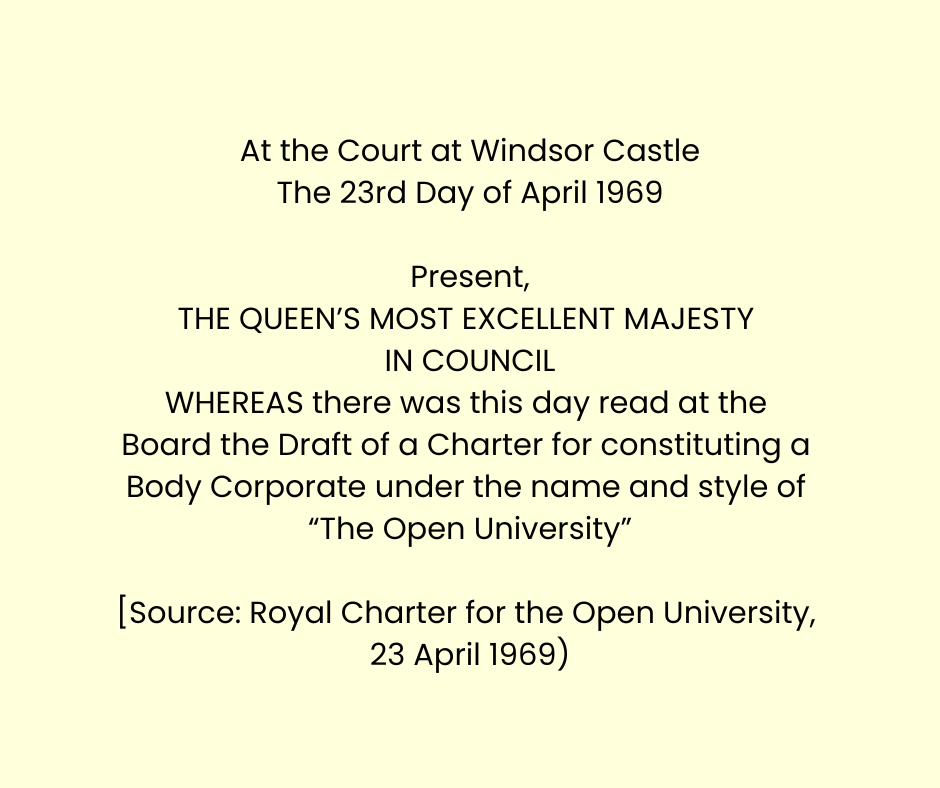A Royal Charter from Queen Elizabeth: a servant-leader
A very personal thought piece from Dr Helen Britton, CVSL Visiting Fellow
This blog was not the piece of writing I had intended to follow the previous thought piece with.
As we find our way to mark the passing of Queen Elizabeth, I felt the need to pay my tribute to someone I had never met in person but who has been a constant background presence in my life. As a child, I cherished my ‘Silver Jubilee’ coin from 1977, polished with an abrasive pad would you believe, until my father realised what I was doing. My response to my father was, "I want to be able to see the Queen's face." The Queen often said: "I have to be seen to be believed".
We celebrated the Queen’s ‘Platinum Jubilee’ in June this year. In September, we said goodbye to our longest-reigning monarch in the most visible display of respectful pageantry. What never ceases to amaze me is how one human individual can impact so many by their conduct and the decisions they make. One cannot fail to admire how Queen Elizabeth discharged her duties over more than seventy years. She has been a constant in our lives in a country that has changed over seven decades.
My friends and colleagues who have met the Queen still talk about the day they met Queen Elizabeth at armed forces events, Buckingham Palace Garden parties or when they were recipients of ‘The Queen’s Award for Voluntary Services’ - the highest award given to volunteer groups across the United Kingdom. She has been the Patron of more than six hundred charities. Through her role, she has been able to highlight the amazing contribution and achievements that the enormous diversity of voluntary and community organisations contributes to the fabric of our lives.
The Queen was an ardent supporter of education and voluntary organisations. On 2 June 2022, the Queen's Awards for Voluntary Services list announced 244 voluntary groups selected to receive ‘The Queen’s Award for Voluntary Service’ in 2022 for outstanding voluntary work in the community. I am immensely proud to know two of the recipients on that list. Knowing people from organisations represented in this and previous year’s award lists cemented for me the tireless work many organisations have carried out. When you study the lists each year, what always strikes me is the very diversity of voluntary group activity.
Queen Elizabeth visited numerous university campuses across the United Kingdom and the Commonwealth during her reign. She was the Patron of the ‘Association of Commonwealth Universities’ for 36 years. She promoted the benefits of further and higher education for students, communities, the economy and wider society. She established ‘The Queen’s Anniversary Prizes’ – the highest honour that a UK further or higher education institution can achieve.
When Queen Elizabeth came to the throne in 1952, there were just eighteen Universities; Cambridge was the first to receive the Royal Charter in the 13th Century.
Today, there are 145 universities, one of which is the Open University founded by the Royal Charter in 1969.

A Royal Charter is the oldest instrument of incorporation granted by the sovereign; a tradition of granting a royal charter in Britain dating from 1066. On the advice of the Privy Council – a largely honorary body of advisers appointed by a sovereign – an independent legal personality is granted to an organisation. The role of managing ‘The Queen’s Anniversary Prizes’ has been carried out by ‘The Royal Anniversary Trust’ - an independent charity - since its inception in 1993. The newly appointed CEO was previously CEO of the UK’s National Leadership Centre.
In paying my respects for the passing of Queen Elizabeth, I am thinking of an expression I have heard used several times recently: 'servant leader'. It is a form of moral-based, selfless leadership style where a leader possesses a natural feeling to serve the greater good ahead of their objectives, a quality certainly exemplified by Queen Elizabeth the second.
Whilst I don’t believe in magic, I do believe that some people, despite their titles, influence us to consider our roles with respect to others. Perhaps, inspiring us to 'go that extra mile', to push that little harder to make something happen.
In thinking of the person, I respectfully see that commitment so often lauded as an interest in people can transcend the mere acts of duty. Maybe that is where the ‘magic’ lies; being able to do that. That is where inspirational leadership lies.

Dr Helen Britton
Helen is an educational practitioner, researcher and entrepreneur. After starting her professional life in the chemical industry, she re-trained to teach mathematics and to develop her entrepreneurial interests in construction and property restoration.
She has lectured in mathematics and Access to Science and Technology. Helen has almost three decades of experience of designing and delivering innovative and inclusive courses and capital projects as part of multi-stakeholder initiatives within the United Kingdom.
3rd November 2022


